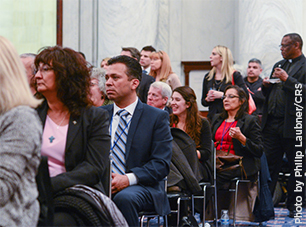

Diocesan Director Toolkit
As part of our commitment to our CRS Diocesan Directors, we provide the following teaching tools and resources in our Diocesan Director Toolkit. We frequently add new tools, so please check back regularly.
Selecting the options below will provide you with useful tools and resources to assist with your role as a CRS Diocesan Director.

The Annual USCCB Catholic Social Ministry Gathering is an opportunity to join CRS’ Diocesan Directors, and Catholic Partners during the CRS Pre event breakfast and gathering which is offered ahead of the opening plenary. If you are attending, please plan to arrive the day before of the start of CMSG to join us. Our teams will share updates on our work around the world, the impact you can make by engaging in our local efforts through CRS’ Campaigns, and for those who wish to go deeper, how to do this by joining and existing CRS Chapter or Community of Solidarity, or perhaps helping to establish others in your respective dioceses or networks around the United States. As a major sponsor, CRS offers a sponsored plenary breakfast, exhibits, Community Workshops, advocacy and policy trainings, policy workshops and organizing advocacy visits to Congress. We look forward to seeing you during these activities planned for CRS partners, diocesan directors, chapter members, and all other participants.
- CRS Diocesan Director Ministry Guidelines
- Mapping Tool to Help You
- CRS Forming Global Missionary Disciples in V Encuentro_ English and Spanish Versions
- Resources for Leaders in Hispanic Ministry
- Fundraising for Catholic Relief Services - Donor Drive Infographic
- CRS Diocesan Director Ministry Guidelines
- Diocesan Inventory—CRS Planning
- Organizing a Diocesan CRS Team
- Ten Tips on Getting the Most From CRS Speakers
CRS speakers are a great way to build global solidarity among Catholics in the United States. Both educational and inspiring, our speakers will share stories about our beneficiaries and their desire to help create a world with peace and dignity for all. Explore these 10 tips to help you get the most out of your CRS speaker. - Diocesan Global Solidarity Team document
Explore several models for strengthening capacity that were developed during a CRS Southeast regional diocesan directors meeting. - Guidelines for Facilitating Meetings
- How to Organize a Legislative Network
- How to Set Up Meetings with Members of Congress
Natural disasters, political crises and humanitarian emergencies often occur when we least expect and without advanced warning. During past emergencies, the U.S. Catholic Church has been most generous in their response to aid those in need. CRS Diocesan Directors are called upon to answer questions from parishes, Bishops, and the media. The following are steps you can take when responding to an emergency.
- Look for information to come to you through your e-mail. When a disaster occurs, CRS will provide you with the most up-to-date information about the crisis itself, current CRS activities in the affected area and ways your community can respond.
- Call your CRS staff contact to see if CRS has programs in the area of the emergency and, if so, inform the Bishop and diocesan leaders about CRS’ response.
- Encourage your Bishop to write letters to all parishes inviting them to pray for victims of the crisis and for those who will risk their lives to assist them.
- Coordinate national collections with your bishop.
- Work with your Communications and Chancery offices to ensure information on the emergency and CRS’ response is getting to parishes.
- Work with secular and diocesan papers to ensure CRS’ name and address are included in their list of agencies responding to a particular crisis and to develop articles on CRS’ response.
- Contact CRS for speaking engagements in your community to speak at parish or diocesan functions and/or be a source of information for news media.
- Report back to the diocese on monies raised and CRS’ response.
We recognize each diocese works differently and encourage you to contact Church Engagement at [email protected] if you have a special need or specific questions relating to emergency response. If your diocese is looking to respond with In-Kind (material) donations, please note that not all material donations can be accepted by Catholic Relief Services, so, therefore, it is important to contact CRS Church Engagement before collecting donated items.
- Parish Guide for Peace in the Holy Land
- Inspire your faith community to advocate for a just solution to the conflict in the Holy Land with these learning activities and prayers. They’re designed for Catholics of all ages.
- Examination of Conscience Based on Catholic Social Teaching
- Communities of Salt and Light Workshop
View a PowerPoint presentation, or right-click and select “save link as” to download to your computer. - Sample Icebreaker Activities
- How a Bill Becomes Law
- Tips for Writing Effective Letters to Your Members of Congress
- Parish Partnership Manual
A resource for parishes in the United States that are in a sister parish or twinning relationship with a parish in another country. - A Short Guidebook to Capacity Building
Explore capacity building and guiding principles for doing more with less staff in the world of social ministry. It is written specifically for use by diocesan directors of social ministry, but may be helpful for anyone wrestling with this issue in any faith ministry. - Organize a Global Solidarity Ministry Team
This step-by-step guide will help you organize a global solidarity ministry team in your parish.

